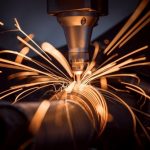Benefits of Using Automated Machining Processes in Metal Fabrication
October 13, 2023 5:56 pm Leave your thoughts In the ever-evolving world of manufacturing and metal fabrication, automation has become a game-changer. With the advent of automated machining processes, businesses can now achieve higher productivity, improved efficiency, and enhanced accuracy in their metal fabrication operations. In this blog post, we will explore the numerous benefits of using automated machining processes in metal fabrication.
In the ever-evolving world of manufacturing and metal fabrication, automation has become a game-changer. With the advent of automated machining processes, businesses can now achieve higher productivity, improved efficiency, and enhanced accuracy in their metal fabrication operations. In this blog post, we will explore the numerous benefits of using automated machining processes in metal fabrication.
1. Increased Productivity:
Automation has revolutionized the metal fabrication industry by significantly increasing productivity. Automated machining processes can perform tasks round the clock, without the need for breaks or rest, maximizing the output. With the ability to run continuously, metal fabrication businesses can meet higher demands and increase their production capacity, ultimately leading to higher profitability.
2. Enhanced Efficiency:
Automated machining processes streamline metal fabrication operations, resulting in improved overall efficiency. These processes eliminate human errors and ensure consistent quality in every product. With automation, repetitive tasks that would typically take hours can now be completed in a fraction of the time, freeing up manpower for more value-added activities. This increased efficiency translates into cost savings, faster turnaround times, and more satisfied customers.
3. Improved Precision and Accuracy:
Accurate measurements and precise execution are critical in metal fabrication. Automation brings a level of precision and accuracy that is unmatched by manual processes. Through computer-controlled systems and robotics, automated machining processes eliminate human errors and maintain consistent accuracy. This ensures that every metal component or part produced meets the required specifications, resulting in high-quality, reliable end products.
4. Higher Safety Standards:
Safety is a top priority in any manufacturing environment, and automated machining processes play a vital role in enhancing safety standards in metal fabrication. By automating hazardous tasks, such as cutting, welding, and heavy lifting, workers are removed from potentially dangerous situations. This reduces the risk of injuries and accidents, creating a safer workplace for employees.
5. Cost Reduction:
While there may be initial investment costs associated with implementing automated machining processes, they often lead to long-term cost savings. Automation eliminates the need for manual labor, reducing labor costs and the associated expenses, such as training, benefits, and potential human error-related expenses. Additionally, automation increases production efficiency, minimizing material waste and improving overall resource utilization, resulting in reduced operational costs.
6. Scalability and Adaptability:
As businesses grow and demand for metal fabrication products increases, the scalability and adaptability offered by automated machining processes become invaluable. Automation allows for easy scaling of production without the need for significant infrastructure or workforce expansions. Moreover, automated systems can be easily reprogrammed and adapted to accommodate new product designs or changes in manufacturing requirements, ensuring businesses remain agile and competitive in a rapidly evolving industry.
7. Data-driven Decision Making:
Automation in metal fabrication processes generates vast amounts of real-time data. This data provides valuable insights into production metrics, machine performance, and overall operational efficiency. By leveraging this data, businesses can make informed decisions regarding process improvements, predictive maintenance, and resource allocation. With data-driven decision making, metal fabrication businesses can optimize their operations, reduce downtime, and maximize profitability.
8. Environmental Sustainability:
Sustainability is an increasingly important aspect of modern manufacturing practices, and automated machining processes contribute to environmental sustainability in metal fabrication. These processes minimize material waste by optimizing cutting, reducing energy consumption, and improving the overall efficiency of resource utilization. By incorporating automation, metal fabrication businesses can reduce their carbon footprint and contribute to a greener future.
Conclusion
The benefits of using automated machining processes in metal fabrication are undeniable. From increased productivity and efficiency to improved precision and accuracy, automation has revolutionized the way metal fabrication businesses operate. The cost reduction, scalability, safety improvements, data-driven decision making, and environmental sustainability further enhance the case for adopting automated machining processes. As the industry continues to evolve, embracing automation has become essential for businesses to stay competitive and thrive in the metal fabrication sector.
Got Questions? Let Us Help!
NW Metal Fabricators, Inc. is a family-owned business that has been servicing customers in Hermiston, Oregon since 1986. We have more than 100 years of experience in the food-processing industry and specialize in the custom production of storage bins, conveyors, catwalks, handrails, gates, storage tanks, water heater tanks, sanitary piping, steam piping, and trailer truck hitches. NW Metal Fabricators, Inc. is an accredited member of the local Chamber of Commerce. We are a dedicated business where quality always comes first. Our customers know that they can count on us to make sure that their products are hand-crafted to meet their specifications. Contact us today to learn more about what we can do for you!
Categorised in: Machining, Metal Fabrication
This post was written by admin
